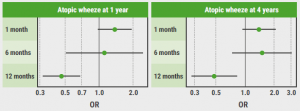https://doi.org/10.55788/739147f4
Previous research has shown that maturation of the gut microbiome is inversely associated with the risk of asthma at age 5 in the offspring of mothers with asthma [1]. After birth, the diversity of microbiota increases and matures as babies grow older and are exposed to microbiota from other sources such as other children, animals, and different foods.
“In our study, we examined the relationship between the maturation of the infant gut microbiome in the first year of life and subsequent atopic wheeze in childhood in the Barwon Infant Study (BIS) cohort,” explained Dr Yuan Gao (Deakin University, Australia) [2]. The BIS has been running in Australia since 2010 and recruited 1,074 babies between 2010 and 2013, all of whom were followed up. At the 1-year and 4-year post-natal reviews, the BIS investigators evaluate whether children have developed allergy-related wheezing or asthma in the previous 12 months, according to reports of their parents. In addition, skin-prick tests are performed to test for food allergies or airborne substances.
For the current study, Dr Gao and her colleagues selected a sub-group of 323 children of the BIS cohort and collected faecal samples 1 month after birth, 6 months after birth, and at 1 year of age. Microbiota in the samples were assessed using 16S rRNA gene amplicon sequencing. With the results, the researchers calculated a “microbiota-by-age z-score” (MAZ), which is a mathematical estimate of the maturity of the children’s gut microbiome.
Each standard deviation increase in MAZ at 1 year of age was associated with decreased odds of atopic wheeze at 1 and 4 years. Babies with a more mature gut microbiome had about 50% reduced risk of allergy-related wheeze at 1 and 4 years (see Figure). In contrast, this association was not found in MAZ scores at 1 or 6 months. “The take-home message is that advanced maturation of the infant gut microbiome in late infancy is associated with reduced odds of atopic wheeze during childhood,” Dr Gao concluded.
Figure: Infant gut microbiota-by-age z-score in a subgroup of the Barwon Infant Study [2]

- Stokholm J, et al. Nat Commun 2018:141.
- Gao Y. Gut microbiota maturity in infancy and atopic wheeze in childhood. Abstract 1434, ERS International Congress 2023, 9–13 September, Milan, Italy.
Copyright ©2023 Medicom Medical Publishers
Posted on
Previous Article
« Healthy maternal lifestyle during pregnancy reduces wheezing and rhinitis in infants Next Article
Future treatment of fatigue in COPD: 4 possible targets identified »
« Healthy maternal lifestyle during pregnancy reduces wheezing and rhinitis in infants Next Article
Future treatment of fatigue in COPD: 4 possible targets identified »
Table of Contents: ERS 2023
Featured articles
Letter from the Editor
Best of the Posters
sRAGE: A novel potential biomarker to assess the risk of acute respiratory events
Most severe asthma patients are candidates for biologic therapy on a global scale
Aspergillus infections: resistance to azole treatment increased in the presence of diesel particles
Asthma in 2023
Tapering from high-dose inhaled corticosteroids possible in most asthma patients treated with benralizumab
Tezepelumab therapy: hints toward a disease-modifying effect?
Digital inhaler programme improves asthma control also in the long term, but not long-term adherence
Respiratory health in children
Large infant study demonstrates the importance of a mature microbiome
Healthy maternal lifestyle during pregnancy reduces wheezing and rhinitis in infants
Mechanism of autophagy in a newborn responsible for deleterious effect of air pollutants
COPD: New Developments
Gabapentinoids increase risk of exacerbations in COPD
Future treatment of fatigue in COPD: 4 possible targets identified
Pulmonary Consequences of Long COVID
Women at higher risk of functional respiratory complaints following a COVID-19 infection
Elevated myeloid inflammation and complement activation present in various phenotypes of long COVID
Pulmonary Arterial Hypertension (PAH): Novel Developments
Encouraging long-term outcomes observed in the treatment of PAH with sotatercept
Chronic thromboembolic pulmonary hypertension: surgery entails encouraging long-term results
Women with pulmonary hypertension have better survival chances than men
Rare Diseases in 2023
Primary ciliary dyskinesia: Idrevloride shows promising results in phase 2 trial
Promising new agent as treatment for pulmonary fibrosis
Novel immunomodulator offers hope to reduce steroid dependency in sarcoidosis
Other Research of Interest
Tacrolimus versus cyclosporin: Less lung graft dysfunction
CPAP effective in reducing cardiovascular mortality in a practice study
Gefapixant curbs chronic cough independent of its duration
Related Articles
November 7, 2018
Endoscopic treatment of asthma
October 12, 2021
Obstructive sleep apnea tied to brain white-matter hyperintensities
© 2024 Medicom Medical Publishers. All rights reserved. Terms and Conditions | Privacy Policy
HEAD OFFICE
Laarderhoogtweg 25
1101 EB Amsterdam
The Netherlands
T: +31 85 4012 560
E: publishers@medicom-publishers.com

